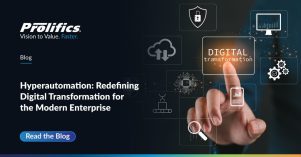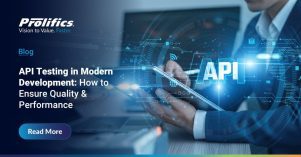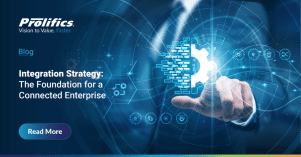By Michael L. Gonzales, PhD
Director of Research for Advanced Analytics, Prolifics
Written in collaboration with and for Eckerson Group.
Many believe that we’ve entered a new era of technical progress that forces companies on a path of continuous innovations. Cognitive computing is considered not only part of this new era, but potentially the core technical driver due to its ability to improve human decision-making through automation and augmentation. This paper will define cognitive computing, describe why cognitive computing is an IT-enabling competitive advantage for companies, and outline the necessary steps that IT must take if they hope to leverage the technology.
A Disruptive Climate
In the early 80’s Microsoft announced to the world that computing power was moving from mainframes to desktops and companies that want to be industry leaders must make that move.1 Apple seems to be willing to continue a long running success of introducing disruptive innovations even at the expense of their own products. The iPhone cannibalized iPod sales and the iPad is eating away at iMac.2 Google has been buying up companies in seemingly diverse industries: from smart thermostat to robotics to artificial intelligent companies. The objective is to corner the market on skilled resources in order to create the next generation of human-computer interaction.3
These are examples of disruptive strategies that companies execute with the goal to reshape or otherwise transform entire industries and the market places in which they compete. As companies redefine the market on their terms, they essentially throw the entire space into a period of disruption. Many analysts concede that technical progress is the catalyst for more innovations, which perpetuates disruption and a fierce competitive business climate.
So what do disruptive strategies have to do with Cognitive Computing? Futurists4, vendors, and leading companies believe that cognitive technology is a disruptive force in an information-intense age. Put simply: Cognitive Computing enables companies to identify and implement innovative, potentially game- changing products and services.
About the Author

Michael L. Gonzales, Ph.D., is an active practitioner in the IT space with over 30 years of industry experience serving in roles of chief architect and senior solutions strategist. He specializes in the formulation of business analytics for competitive advantage in global organizations. Recent engagements include companies in the top global 100.
Dr. Gonzales holds a Ph.D. from the University of Texas with a concentration in Information and Decision Science. He has presented and published his research at leading IT international conferences, including: Decision Sciences Institute, Americans Conference on Information Systems, and Hawaii International Conference on Systems Science. His research streams include analytics against extremely large data and success factors for IT-enabled competitive advantage.
Dr. Gonzales is a successful author, industry speaker and is currently the Director of Research for Advanced Analytics for a leading IT consulting firm, Prolifics, Inc.
About Eckerson Group
 Eckerson Group is a research and consulting firm that helps business and analytics leaders use data and technology to drive better insights and actions. The firm helps companies develop strategies and roadmaps that maximize their investment in data and analytics. Its consultants and researchers each have more than 20 years of experience in the field and are uniquely qualified to help business and technical leaders succeed with business intelligence and analytics, big data management, data governance, performance management, and the internet of things.
Eckerson Group is a research and consulting firm that helps business and analytics leaders use data and technology to drive better insights and actions. The firm helps companies develop strategies and roadmaps that maximize their investment in data and analytics. Its consultants and researchers each have more than 20 years of experience in the field and are uniquely qualified to help business and technical leaders succeed with business intelligence and analytics, big data management, data governance, performance management, and the internet of things.
1 Hagel, John et al, Shaping Strategy in a World of Constant Disruption, HBR, October, 2008.
2 Fox, Justin, Apple Versus the Strategy Professors, HBR, January, 2013.
3 Rowinski, Dan, Google’s Game of Moneyball In the Age of Artificial Intelligence, January, 2014.
4 Mayes, Randall, The Future, The Futurist, November-December, 2014.




